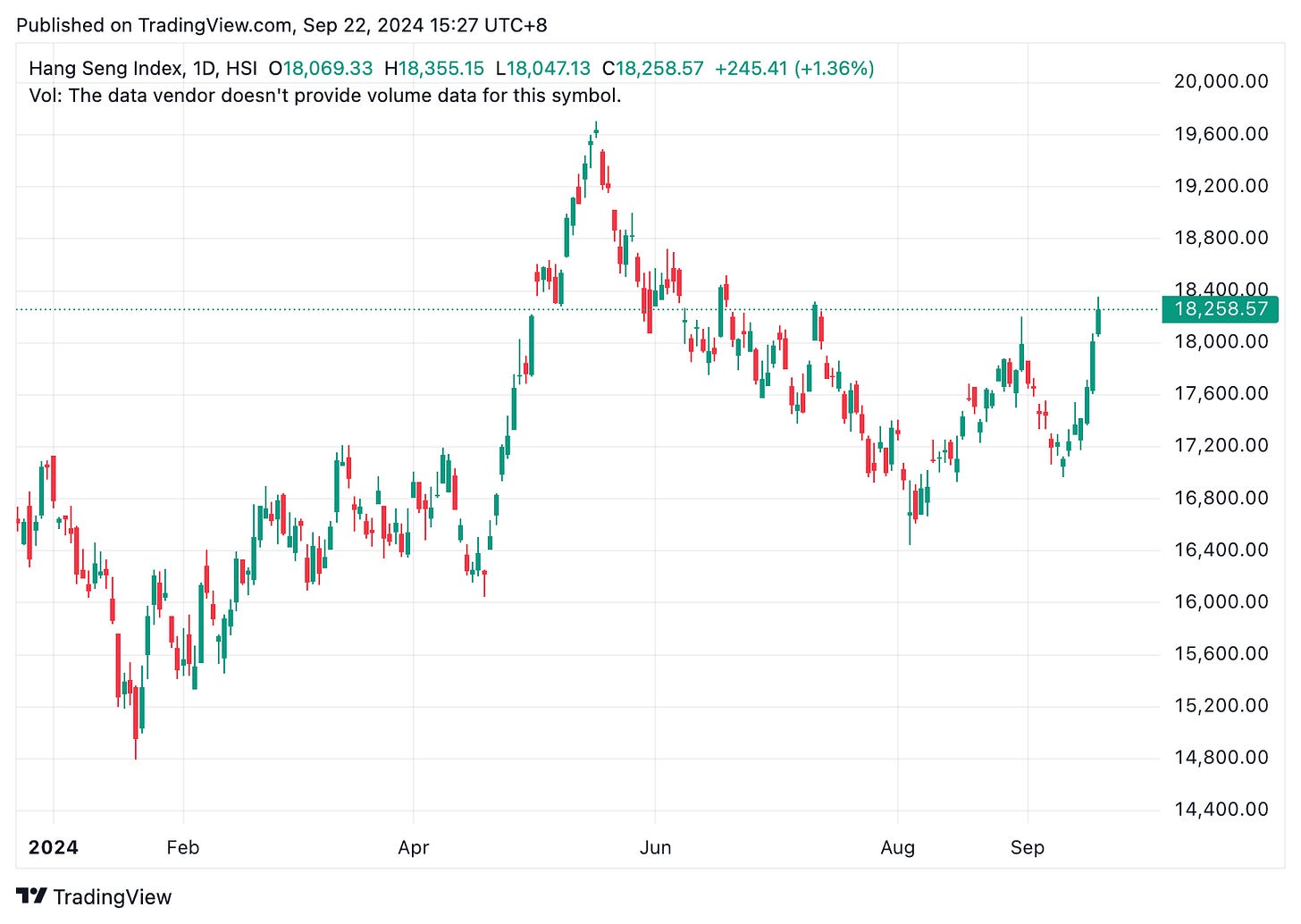Hong Kong Gold Rush Weekly: lower loan costs, stock market rally, Midea's US$4 bn IPO, subsidy for smart production and green finance ties with the Middle East
5 minutes read for your next opportunity in the Asian financial hub
Hi, this is Yifan in Hong Kong. Here’s what you should know about business and investment opportunities that happened in the Asian hub this week.
Fundamentals:
HK cut base interests following the Fed move
Market pulses:
Stock market jumped more than 5% on big rate cut
Midea’s US$4 billion IPO fuels hope for market warm-up
Business signals:
HK launches US$1.28bn subsidy for smart production amid customization and green trend
Closer sustainable finance ties with the Middle East
Fundamentals
#Hong Kong cut base interests following the Fed move
The Hong Kong Monetary Authority (HKMA), the city’s de facto central bank, cut its base interest rate by 50 basis points to 5.25% last Thursday after the US Federal Reserve announced its first rate cut in 4 years.
Major lenders, including HSBC and Bank of China (Hong Kong), lowered their best lending rates by 25 basis points to 5.625%. Another note-issuing bank Standard Chartered trimmed the loan rate for its best customers by a quarter point to 5.875%.
Financial Secretary Paul Chan Mo-po said the reduction in interest rates would benefit local businesses, bolster capital markets, and soften local currency. This depreciation could also help draw in tourists and stimulate spending.
Backdrop information: Hong Kong’s currency is pegged to the greenback in a tight range of 7.75-7.85 per dollar under the Linked Exchange Rate System. This anchor of currency stability that allows free movement of capital is much needed for a small, open economy and an international financial hub like Hong Kong. But the flip side is the city has to import the US monetary policy.
Market pulses
#HK stock market cheers rate cut but lacks fundamentals
Benchmark Hang Seng Index (HSI) surged 5.55% last week, closing at 18,258.57 points on Friday. The rally came after the Fed opted for a larger-than-usual 50-basis-point rate cut at its meeting last week.
Lorraine Tan (陳麗子), director of equity research (Asia) at Morningstar, said a 50-bps cut has a slightly elevated but one-off impact on equity markets.
“A larger rate cut may see a bigger initial positive reaction, mainly for dividend yield and interest rate sensitive plays – namely consumer cyclical, real estate, biotech and technology stocks, but I think that it should have minimal sustained impact given that the normalization in US interest rates is largely factored into company valuations.” —— Lorraine Tan at Morningstar.
In my previous discussion with Soochow Securities’ chief economist Chen Li last month, the top Chinese analyst said a pivotal factor that will determine the Hong Kong stock rally is whether the People’s Bank of China (PBOC) would follow the Fed’s move in an interest rate cut.
Deflation and relatively high real interest rates present a strong case for further rate cuts. But China’s central bank has been cautious in its monetary easing as aggressive rate cuts would add pressure on the renminbi and thus spur fund outflows. PBOC left two benchmark rates — one-year and five-year loan prime rates unchanged last week.
Read more on Chen Li’s views on HK stocks: Top Chinese market analyst: HK stocks bottom out, but rebound evasive - https://www.chinadailyhk.com/hk/article/591535
Meanwhile, potentially escalating geopolitical tensions could become a major drag on the city’s equity market, given the two US presidential candidates’ tough tone on China issues. US Vice-President Kamala Harris will square off against former US President Donald Trump on Nov 5, with the winner taking office on Jan 20.
On a positive note, there’s little room for further market decline thanks to the three cushions:
Cheap valuations: The benchmark Hang Seng Index, the majority of which comprises mainland firms’ shares, trades at around 10 times forward earnings, versus 27 times for the S&P 500.
Increasing fiscal firepower: China’s conservative fiscal policy in the 1H fuels mounting expectations for more fiscal support to help the world’s second-largest economy hit its target amid a myriad of challenges.
Limited room for the crashed real estate sector to further slide down
Read more on Hong Kong stock outlook: HK bourse profit drops in H1 as reform efforts pale amid market headwinds - https://www.chinadailyhk.com/hk/article/591156#HK-bourse-profit-drops-in-1H-as-reform-efforts-pale-amid-market-headwinds-2024-08-21
#HK’s largest IPO in years fuels hopes for market warm-up
Chinese home appliances giant Midea Group raised nearly US$4 billion in Hong Kong’s biggest stock offering in almost four years. It jumped 8% on its Tuesday trading debut after pricing shares at the top end of the range at HK$54.80 (US$7.03).
This was Hong Kong’s largest fundraising since the US$6.2 billion initial public offering (IPO) of video-sharing app Kuaishou Technology in February 2021, and the second-largest new offering globally this year behind Lineage Inc's IPO in New York which raised US$5.1 billion.
Hong Kong has been reeling from a moribund new offering market. According to the city’s exchange operator, it had 30 new offerings that raised HK$13.4 billion ($1.72 billion) in the first half of 2024. That was down around 25% from total funds raised in new listings in the same period last year. Chinese e-commerce giant Alibaba earlier this year ditched its plan to list its cloud and logistics units partly because of a poor market environment.
Business signals
#HK launches US$1.28bn subsidy for smart production amid customization and green trend
The Hong Kong Innovation and Technology Commission has launched a HK$10 billion ($1.28 billion) funding program for manufacturers in strategic sectors such as health technology and artificial intelligence to set up new smart production facilities in the city.
The program is part of Chief Executive John Lee Ka-chiu’s plan to support the innovation and technology sector, as proposed in his Policy Address last year.
Under the New Industrialisation Acceleration Scheme, each project must have a minimum cost of HK$300 million. Participating companies are required to contribute at least HK$200 million, with the government funding a maximum of one-third of the total approved project cost or HK$200 million, whichever is less. Each company can have a maximum of two projects endorsed, receiving a total of up to HK$200 million collectively under the program.
The launch comes as manufacturers’ demands for smart solutions in digitalization and green transformation grow amid a new normal of customized production and sustainable development, according to a study by the Hong Kong Productivity Council (HKPC), a statutory body, and Deloitte, a professional services network.
The study, which surveyed 288 manufacturers in Hong Kong, revealed that nearly seven out of 10 agree that the emerging trend in the manufacturing sector is lots of variety in fewer quantities, necessitating swift adaptation to meet customer demands.
However, the practical adoption of smartification technology remains limited while businesses acknowledge the significance of personalized small-scale manufacturing. The study showed that merely 19% of respondents have implemented smartification solutions, with more than half of surveyed companies indicating a lack of strategies in this area.
Meanwhile, sustainability is gaining momentum, with 67% of the surveyed companies reporting current or anticipated customer demands for the integration of eco-friendly sustainability practices into their manufacturing operations.
The report is available on the official website of HKPC - a government body established in 1967 (Chinese only): https://www.hkpc.org/en/about-us/hkpc-publication/industry-support
#HK deepens sustainable finance ties with the Middle East
The Hong Kong Monetary Authority (HKMA) - the city’s de facto central bank - and the Dubai Financial Services Authority (DFSA) last Monday signed a Memorandum of Understanding (MOU) to strengthen their strategic collaboration in sustainable finance.
According to HKMA, both authorities will facilitate increased cross-border communication, foster the sharing of insights on recent trends, and conduct joint research and events to advance developments in this emerging sector.
This partnership came as HKMA and DFSA held their inaugural Joint Climate Finance Conference in Hong Kong last week amid a worldwide drive for climate change.
According to the Emissions Gap report published by the United Nations in November, which evaluates countries' commitments to addressing climate change in comparison to what is required, it is projected that the world will experience a temperature increase of 2.5 to 2.9 degrees Celsius above preindustrial levels if governments do not enhance their climate action efforts.
In the event of a 3-degrees-Celsius increase in the global temperature, climate scientists predict that the world may exceed crucial thresholds, resulting in irreversible outcomes like uncontrolled ice sheet melting and the drying out of the Amazon rainforest.
Meanwhile, Hong Kong has been stepping up efforts to attach a green label to its global financial hub status. Official figures show the total amount of green and sustainable bonds issued in Hong Kong exceeded US$80 billion in 2022, accounting for one-third of those issued in the entire Asian region. Over 200 environmental, social, and governance (ESG) funds with assets under management of US$159 billion were authorized as of September 2023.
Financial Secretary Paul Chan Mo-po this February unleashed several initiatives in his 2024-25 Budget to foster a low-carbon economy. One key priority is to formulate sustainability disclosure standards and roll out a "road map" and a "vision statement" to help businesses and financial institutions in sustainability reporting and the analysis of relevant data.






